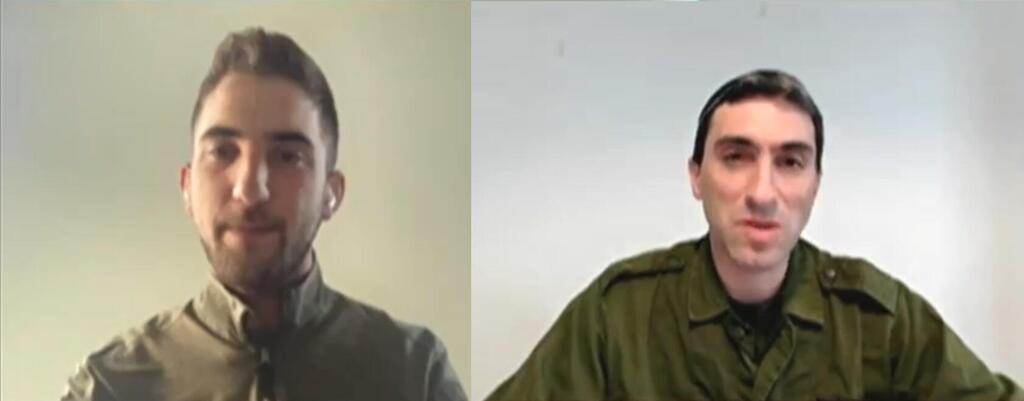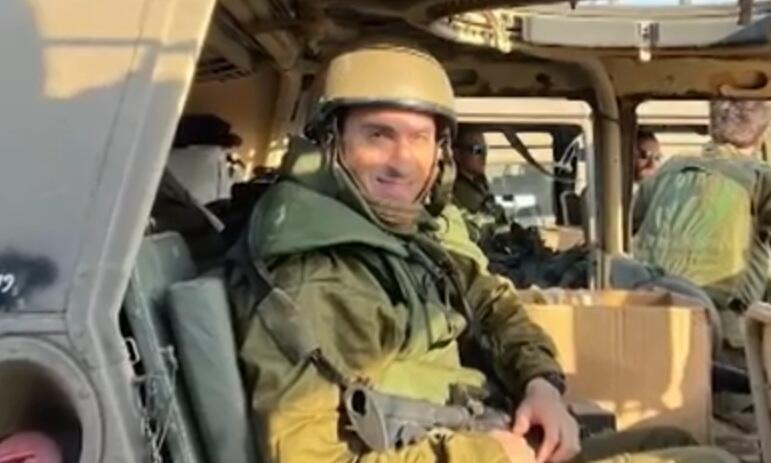Getting your Trinity Audio player ready...
Sergeant First Class Eli Zivan and Sergeant Major Yoni Heilman have always felt a deep connection to Israel, which inspired them to serve as lone soldiers in the IDF. When war broke out on October 7, they immediately took action to join the fight, reaffirming for them that Israel was their home.
Yoni, tell us a little about yourself, and how you made aliyah to Israel the first time.
“I grew up back and forth between Israel and America,” Heilman began. “I first served in Nahal as a volunteer through the Mahal program, and I made aliyah with my wife in 2009 when we were expecting our first child. We returned to the United States for a time but made aliyah again a few years ago.”
The soldiers who made aliyah during the war
(Video: Yaron Brener)
Heilman’s connection to Israel has always been strong. His initial service as a lone soldier reflected his commitment to making Israel his home.
And I understand that you made aliyah as a lone soldier. What was your motivation?
“I always knew I would spend my life in Israel, but I wasn’t quite ready to make aliyah at 18. Still, I wanted to serve in the army and be ready to answer the call when needed,” Heilman explained.
In 2002, shortly after Operation Defensive Shield, Heilman came to Israel as a lone soldier in the Nahal Brigade. “I grew up in a Zionist household where Israel was a core part of my identity. For me, serving was about earning my place in this country,” he said.
Eli, for you, it was a bit different because you made aliyah with your family. How was it for you?
Zivan shared that he is the youngest of five brothers, all of whom served in combat units during the war. “We were raised in a Zionist home with the understanding that Israel is our land, and this is where we live our lives,” he said.
“Every day during this war, I felt like I was fulfilling the Zionist dream I grew up with. I was doing exactly what my upbringing prepared me for,” Zivan added.
Where did October 7 catch you?
Zivan recalled being in Mexico on the Pacific coast between school semesters when news of the terror attacks broke. “I saw what was happening on my phone and immediately started making calls. The Mexican consulate helped me secure a flight, and by October 9 I was back with my team,” he said.
Soon after his return, Zivan and his unit were clearing the area around the Nova music festival and nearby kibbutzim, preparing for the next steps in the military operation.
Heilman, already in Israel on October 7, was at home in Modi’in with his family. “I was about to leave for an errand when I got the call. By 9:30 a.m. or 10 a.m., I was at our base, gathering gear. Thirty-six hours later, we were in the south, working in the same areas Eli mentioned, including the Nova festival and several kibbutzim,” he said.
I understand that you decided to document your experience in a WhatsApp group. You have many followers.
“Yes,” Heilman confirmed. “It started as updates to my wife, then my family. Eventually, it grew to include hundreds of people.”
For Heilman, writing became a form of processing the intense experiences of war. “Every day, I’d put my thoughts down as a way to clear my mind enough to sleep for a few hours. It wasn’t my intention to attract so many readers, but people wanted to feel connected to what was happening on the front lines,” he said.
What do you share?
“Mostly, I share my feelings,” Heilman explained. “I can’t always describe what I’ve seen or experienced, but I try to convey the emotional reality. In the first month, our unit focused on securing areas and performing the tragic but sacred duty of collecting our fallen brothers and sisters.”
He also highlighted the inspiration he drew from his fellow soldiers. “The heartbreak was immense, but the commitment of so many soldiers showing up, ready to do whatever was needed to make this country safer, was profoundly moving,” he said.
A message you wish to convey, both of you.
Zivan began, “My greatest wish is for the safe return of all 101 hostages and for everyone serving to come home safely. I hope we complete this mission at the highest level, so our friends and brothers who fell for this country will not have done so in vain.”
Heilman echoed these sentiments. “There’s been a lot of discussion about the heavy burden on the nation, and while we are tired, it’s an honor to be part of this effort. We are not ready to go home until everyone is brought back, and we’ve made this country safe again.”
Get the Ynetnews app on your smartphone: Google Play: https://bit.ly/4eJ37pE | Apple App Store: https://bit.ly/3ZL7iNv








